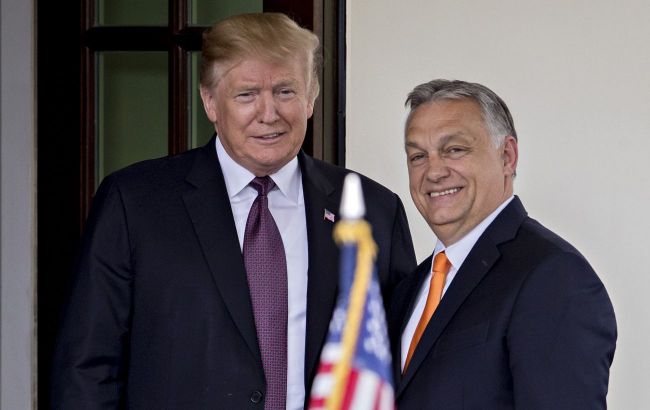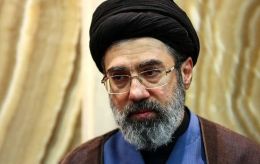Orbán, Meloni, Starmer: Trump's allies and adversaries in Europe
 Donald Trump and Viktor Orbán (photo: Getty Images)
Donald Trump and Viktor Orbán (photo: Getty Images)
Most European leaders met the election of Donald Trump as president of the United States with concern, as many of them openly or secretly hoped that his opponent would win. But, of course, for some European politicians, the results of the US election were a real celebration.
RBC-Ukraine peeks at who can be Trump's friends in Europe and who can be viewed as his "enemy".
Contents
After the US presidential election, most influential politicians from around the world have tried to establish ties with Donald Trump. Europe, the most important region for Ukraine, is no exception. Most European leaders, such as Emmanuel Macron, Pedro Sánchez, or Ulf Kristersson, are only trying to establish a working relationship with Trump. There are also obvious friends of the US president-elect in Europe with whom he has long-standing contacts. And some politicians have a difficult relationship with the American for various reasons.
Trump's allies
Most of Trump's friends in Europe share his views on international politics and the economy, but there are other nuances as well.
Hungarian Prime Minister Viktor Orbán established ties with Trump during his first presidency in 2017-2021. The intensity of their cooperation was low at the time, as Europe was definitely not Trump's top priority.
In 2024, the situation changed. Orbán began to reestablish contacts with Trump long before the presidential election when his victory was far from certain. In fact, he was the only EU leader to make a direct and open bet on the Republican's victory. Judging by the comments of his staff, Trump appreciates this fact. Orbán's credibility is further enhanced by his mediation efforts to end the war against Ukraine. Including his August visits to Kyiv, Moscow, Beijing, and Trump's residence in Florida, and phone calls to Trump and Putin. At the same time, Orbán's status as an outcast in the European Union rather diminishes his chances with Trump.
Italian Prime Minister Giorgia Meloni has also known Trump for a long time, since the days when she was not in charge of the government. Meloni has participated in several annual conferences of the American conservative movement, and Trump's former chief strategist Steve Bannon was a keynote speaker at Meloni's Fratelli d'Italia party conference in 2018. The two politicians met in Paris on December 7 during the opening of Notre Dame Cathedral. This meeting was the first since Trump's return to big politics.
“I was with her (Meloni - ed.) a lot. She's a real live wire, let me tell you. She's great,” Trump told the New York Post after returning from Paris.
Unlike Orbán, Meloni has a close working relationship with the European bureaucracy in Brussels and leads one of the most powerful countries in the European Union. All of that adds to her points in dealing with Trump.
Like Orbán, Nigel Farage, the leader of the opposition party Reform UK in the United Kingdom, staked his support on Trump long before the latter's victory. This anti-systemic British politician has led several political projects. In particular, the UK Independence Party, which played an important role in making the British vote to leave the European Union in a referendum. Farage remained the most powerful critic of European integration in the UK. His party consistently won high places in the European Parliament elections, but in Britain, Farage managed to get into parliament only this year as a member of his new party, Reform UK.
Like Meloni and Orbán, Farage has long known Trump. During the US election campaign, he visited and openly campaigned for the US president-elect. Contacts between the two politicians have only grown stronger since Trump's victory. It seems that Farage will play an increasingly important role in UK-US relations. Amid support from the United States and a series of political failures of the current government, Farage's party has become a leader in the ratings. According to the Daily Mail, Trump's entourage considers Farage to be the next prime minister of the United Kingdom. Moreover, according to British media, Trump's close ally, multibillionaire Elon Musk, may donate $100 million to his party.
Trump's adversaries
Trump's relations with European institutions in Brussels are complicated, primarily because of systemic contradictions between the United States and the European Union. European Commission President Ursula von der Leyen is the personification of the European bureaucracy, so all of Trump's negative attitudes toward the EU are focused on her. During Trump's first presidency, she was Germany's defense minister and had conflicts with the United States. Trump insisted that European NATO members increase defense spending. Germany tried to avoid that.
At this stage, the main problematic issue between the US and the EU is trade. Trump plans to raise tariffs on imports from the European Union, which will hit the EU economy. The president of the European Commission is trying to establish a dialog with Trump by preparing a number of lucrative proposals, such as buying additional gas from the US to replace Russian gas. But will these carrots work?
British Labor Prime Minister Keir Starmer came to power only four months before Trump and has already managed to spoil relations with him. Long before the US election, Starmer bet on Trump's rival Kamala Harris and lost. Representatives of the Labor Party privately traveled to the United States to campaign for Harris as volunteers, and Starmer himself saw it as “no big deal.”
Starmer's fellow party members used harsh epithets for Trump: “buffoon”, "Nazi supporter", or even ”tyrant in a wig”. There are not many systemic contradictions between the UK and the US: bilateral trade is relatively balanced, and the UK spends a lot of money on defense (low defense spending is one of Trump's complaints against European NATO members). However, Trump's personal dislike of Starmer could seriously cool relations between the two countries.
So far, the current German Chancellor Olaf Scholz has had a difficult relationship with Trump since 2017. When Trump was the president for the first time, Scholz was the German finance minister and avoided increasing German defense spending in every way possible. Trump's plans to impose new tariffs on European imports will hit Germany first and foremost, creating an additional point of tension between Washington and Berlin. But the ruling coalition in Germany has collapsed, early elections are expected, and Scholz is likely to lose his post, so the problems between the United States and Germany will have to be solved by another Bundeskanzler.
Sources: New York Post, Daily Mail, The Spectator, Bloomberg.



